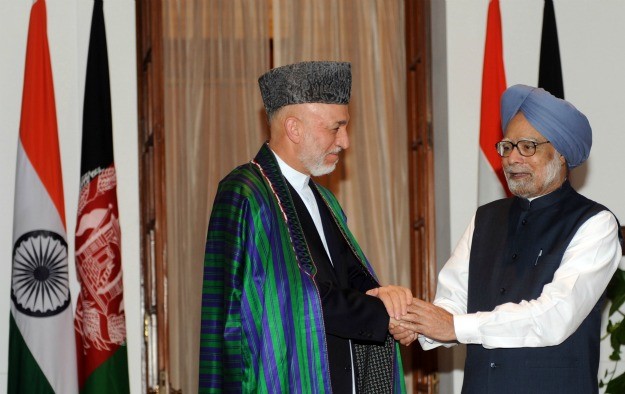 Afghanistan is going through critical security, political and economic transitions.
Afghanistan is going through critical security, political and economic transitions.
The security situation in Afghanistan is fragile not due to the weakness or inabilities of the valiant Afghan Security forces, but due to the continued threat of terrorist and extremist groups to Afghanistan's security. This was demonstrated most recently by the condemnable attack on the Indian Consulate in Jalalabad on 3rd August which led to injuries to several Afghan security personnel guarding the Consulate and the killing of several innocent Afghan citizens, including 10 children.
India does not have an "exit policy" in Afghanistan and will not be deterred by such attacks. We do not see this attack as only aimed against India, but also against the efforts of the Afghan people to overcome the tragic consequences of the last several decades of war and conflict. The Secretary General's report speaks about 3500 Afghan servicemen being killed and wounded in action in the second quarter of 2013. We salute the valor of ANSF personnel who have made the supreme sacrifice for the objectives and values enshrined in the Afghan constitution. The recent merciless killing of Sayed Kamala Sushmita Banerjee - a woman medical worker of Indian origin who was married to an Afghan national - reflects the intolerance of those who oppose Afghanistan's socio-economic development as also the challenge that lies ahead in Afghanistan.
We commend the efforts being made by the Afghan Government in ensuring completion of all technical preparations to hold a successful Presidential election. A peaceful and free election process that elects an Afghan President acceptable to the people of Afghanistan remains the key.
The Presidential elections in 2014 will be yet another significant step towards the political reconstruction effort in Afghanistan which must always remain Afghan-led and Afghan-owned. This will be the 3rd democratic election in Afghanistan, a significant achievement for Afghanistan, and a sign of maturity of its new political system.
The international community must strongly support the Afghan authorities preparations in this endeavour, and at the same time strongly oppose any outside effort to derail the process.
Many of the terrorist attacks in Afghanistan have been coordinated by the Taliban along with the Al Qaida and their affiliates. These definitely are pointers that we must be continuously watchful of the designs of these terrorist organizations. The Al Qaida and Taliban Sanction Committees must remain proactive and attentive in their listing and delisting process of individuals and entities for targeted measures.
The international community should continue to back the efforts of the Afghans in addressing the security and terrorist challenges faced by them. Concerted action is also needed to isolate and root out the syndicate of terrorism, which includes elements of the Taliban, Al-Qaida, Lashkar-e-Taiba and other terrorist and extremist groups. It is, therefore, important that the transition plan takes into account the threats posed by these terrorist organizations and factors in the security situation on the ground.
The international community must re-assess the role it wishes to play in Afghanistan's internal political process, which brings me to the issue of the renewed mandate we should confer upon the UNAMA.
Over the last decade UNAMA has performed a vital political, humanitarian and development role in Afghanistan along with other agencies of the UN system. With the 3rd democratic elections underway, the political reconstruction effort in Afghanistan has reached a level of maturity. We should, therefore, define UNAMA's political mandate to ensure that it keeps its focus on supporting the institutions of politics rather than the political process itself, which must be left to Afghanistan's own leaders.
At the same time the new mandate for UNAMA must step-up its humanitarian and developmental role through better delivery of assistance in Afghanistan, since the UN is uniquely placed with access to the remotest and most isolated communities in the country. When basic services like health, education, nutrition are provided on a regular basis to all Afghans, we would have created a vital 'space' for the new Afghan political system to mature and take deep roots in Afghan society. This development and humanitarian assistance must also be consistent with the ongoing efforts to develop the capacities of the Afghan public administration to deliver such services on its own. Wherever and to the maximum extent possible, the delivery of the humanitarian and development services must be through Afghan state institutions - because it is not capacity 'substitution' but 'capacity building' that we are seeking to achieve in Afghanistan.
The experience of the last decade also shows that the UN Mission in Afghanistan, like some other missions, has also been plagued by problems of coherence in performing its mandated activities. This has inevitably led to a duplication of resources, and a higher cost of programs. The renewed mandate of the UNAMA should also address this issue.
2014 would be an important watershed for Afghanistan. The international community's support for Afghanistan would be critical in this transition. We appreciate the good work being done by UNAMA in often trying conditions and assure you that India will continue to stand by Afghanistan during this period of transition and thereafter.
Statement by Ambassador Manjeev Singh Puri, Deputy Permanent Representative of India to UN at the Security Council Debate on UN Assistance Mission in Afghanistan on September 19, 2013 in New York.